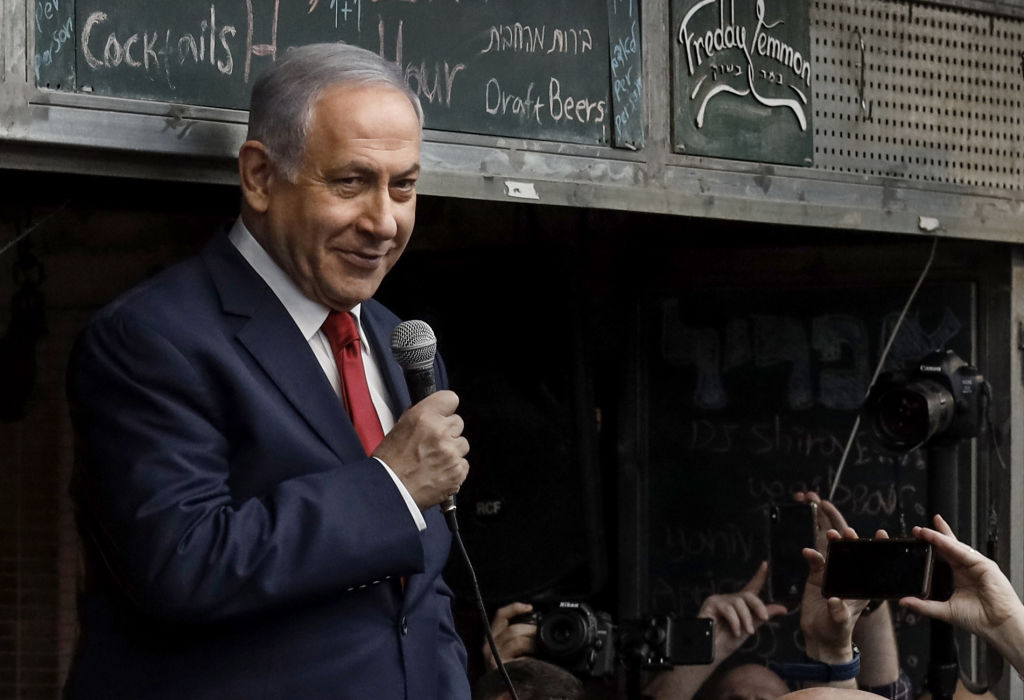Benjamin Netanyahu, facing defeat in today’s Israeli elections, has made a final pitch to his right-wing base. Over the weekend, the Likud leader said that, if re-elected, he would apply Israeli sovereignty to both the settlement blocs and isolated communities deeper inside Judea and Samaria. ‘From my perspective, each of those settlement points is Israeli,’ he said. ‘I don’t uproot any, and I won’t transfer them to the sovereignty of the Palestinians.’
And so the final hours before an Israeli election were counted down in the traditional manner (at least since Bibi has been on the scene): the Europeans and the American left screeching ‘apartheid’, the settlers rounding up votes like the land of Israel depended on it, and Bibi huddled with his pollsters hoping the voters would fall for it again. Bibi clearly knows how to play to voters’ dark recesses. As Anshel Pfeffer documents in his biography of Israel’s ninth prime minister, Bibi isn’t Trumpian, Trump is Bibian. The strongest indication that Israel has no intention of annexing Judea and Samaria is Netanyahu promising to do so. The Likud leader is notorious for election eve pledges that expire once the polls have closed.
Netanyahu might be weaponising Judea and Samaria for votes but, whoever forms a governing coalition after today’s poll, we can expect to hear a lot more about the region the world calls the ‘West Bank’. The Israeli-Arab conflict has been theorised as all manner of wars — religious, national, civilisation, and territorial — but it is also a struggle over, and against, topography. Settlements and land swaps, Jerusalem and the ‘right of return’ — these are matters that politics has answers for, even if one party or both resents them. But the land will not compromise; its hills and rifts cannot be brought to the negotiating table. As Chaim Herzog said: ‘Judea and Samaria can be likened to a giant staircase leading up from the sea to the central watershed plateau and down again, though in much steeper steps, to the Jordan valley’. That staircase dominates Israel’s centre and overhangs its capital city; whoever controls the staircase, controls the floor below.
For Israel to withdraw, it would require a genuine and lasting peace with a demilitarised Palestinian state, control over the Jordan valley, unilateral authority over the airspace and provisions against new territorial vantage points being used as a base for terrorism, communications sabotage or hostile intelligence-gathering. Israel needs more than a Palestine that recognises it; it needs a Palestine it can trust. Donald Trump’s forthcoming ‘deal of the century’ will fail like every attempt before it because such a Palestine does not exist yet. Perhaps it never will.
Even when Israelis were still dreamers and hoped the Palestinians could be tempted into the reverie, they knew the odds were stacked in favour of the cold light of day. David Ben-Gurion said an Israeli realist must believe in miracles but as a young man the Old Man was more agnostic: ‘There is an abyss, and nothing can fill that abyss. We want the Land of Israel to be ours as a nation. The Arabs want the land to be theirs as a nation.’ Attempts at (further) partition have failed because, whether on territory or refugees or sacred sites, the most either side is willing to give falls far short of the least either side is able to accept. Were a Ben-Gurion miracle to arrive and break these impasses, the abyss would remain until the Palestinian national story changed. Revisionist Zionists still sing the song but they long ago surrendered the ‘East Bank of the Jordan’ to the realities of the region. In the corridors of Ramallah, the tutorial rooms of Birzeit university and on the streets of Nablus and Khan Yunis, Greater Palestine is a living project. Israel cannot accept a Palestinian state without an end to the conflict and the Palestinians cannot accept a state for fear that it would.
The failure of the two-state solution has crowded the field with alternative proposals of varying feasibility and respectability. Israeli sovereignty over Judea and Samaria, the cradle of Jewish civilisation, is supported by history, Scripture, and even international law but incorporating almost three million Arabs would imperil either the Jewish state’s demography or its democracy. Unilateral Israeli withdrawal would make way for another Gaza and daily shelling of Jerusalem from the Judean hills. A binational state — currently gaining traction on the international left — would dismantle Israel and leave six million Jews at the mercy of their longtime enemies. ‘Jordan is Palestine’ is historically illiterate, a Palestinian-Jordanian confederation unwanted by Amman, and the New State Solution (building a Palestinian state in Sinai) a non-starter with Cairo.
Each plan has its own flaws but their major common error is the attempt to solve a problem which cannot be solved for now. The Israeli political scientist Eyal Lewin proposes instead a ‘no-solution solution’: ‘[I]nstead of seeking an unattainable peace resolution, aim for the least bad option: a state of regional stability in the Middle East’. Whoever wins tonight, whatever their campaign rhetoric, whatever comes of the Trump plan, geography as much as politics favours the no-solution solution, at least until the Palestinians are willing to settle for peace. The land will not change and so the people on it must.







Comments